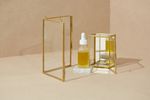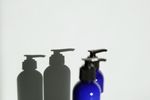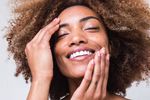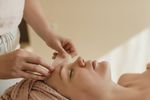The word "clean" seems to imply all good qualities: pure, all-natural, non-toxic and healthy for the planet. With so many positive connotations, it’s no wonder "clean" beauty products are increasingly sought-after. In fact, according to research from Statista, the clean beauty industry is estimated to reach 22 billion dollars by the year 2024.
But if you've ever strolled the skincare aisles of a drugstore — or scrolled through an online "clean beauty" store — you probably know how overwhelming it can be to choose the right products. Below, we turn to the pros to clear the air about "clean beauty," the most common offenders and what to stock up on instead.
What Does "Clean" Really Mean?
Unfortunately, the definition of "clean beauty" is murky — to say the least. The last piece of legislation for the personal care industry was passed way back in 1938. Translation: Companies have essentially been free to put whatever ingredients they wish into their products, from skin irritants to endocrine disruptors.
Even today, "there is no clear definition of what 'clean beauty' really means, so it gets thrown around as a marketing term that people take at face value," says Cybele Fishman, MD, an integrative dermatologist in New York City.
For some people, using "clean" beauty products may mean avoiding common ingredients that cause allergic reactions, including natural ingredients such as essential oils, Fishman explains. For others, it may mean avoiding endocrine disruptors (man-made chemicals that can change the way that hormones work in the body, often in harmful ways)
For still others, it means only using products that are safe enough to ingest. "I believe beauty products should be pure enough to eat and made up of simple ingredients that you can pronounce and clearly recognize, such as almond oil, avocado oil or turmeric essential oil," as Aimee Raupp, licensed acupuncturist, creator of Aimee Raupp Beauty and consultant for Traditional Chinese Medicine at THE WELL, puts it.
Not only does "clean" mean different things to different people, but it can also be hard to find "clean" products that work for you. What's more: A multitude of buzzwords, including natural, cruelty-free, hypoallergenic and organic, aren’t regulated. In other words, there’s no official definition or requirements behind those labels, per the Food & Drug Administration (FDA).
"Some of these ingredients are even banned in other countries, but still under review in the United States."
Why Make the Switch?
Despite all the confusion, going "clean" can be worth it, since what you put on your skin gets into your bloodstream and affects your hormones and physiology, Raupp explains. Plus, the wrong beauty products can cause a lot of damage over time, explains Claudia Colombo, an esthetician and founder of Claudia Colombo Skin Wellness. Many traditional products can include ingredients thought to be endocrine disruptors, carcinogens or skin irritants. Even scarier: Some of these ingredients are even banned in other countries, but still under review in the United States.
Endocrine disruptors, for instance, can mimic the way our natural hormones work, tricking our body into thinking that they are hormones, while others block natural hormones from functioning properly. They have been suspected to be associated with interfering with the female and male reproductive systems and conditions such as infertility, as well as obesity, diabetes and even cancer. Other ingredients can mess with your skin’s barrier and cause irritation, especially if you have sensitive skin or a skin condition such as eczema.
Where to Begin
Because the beauty industry is still the Wild West in terms of regulations, the first step is to find brands whose standards you trust, suggests Colombo. For example, THE WELL has in-house standards for any beauty product we carry in the shop or use in spa treatments. All products are vetted to ensure that they're mindfully sourced, effective, as well as free of known endocrine disruptors, toxins and carcinogens.
While it might be tempting to dump everything you own and start fresh, there’s no need to change all of your products immediately, says Sarah Brown, founder of Pai Skincare, an organic skincare company based in the UK and carried by THE WELL. Instead, consider replacing the products that you use most often, cover the most skin surface with and leave on for long periods of time, such as your daily body moisturizer, facial cream and sunscreen. Then, move onto cleaner versions of other products, such as your face wash, deodorant, shampoo and conditioner, hand soap and makeup.
If you're not sure whether the products that line your bathroom shelf fit the bill, Better Goods offers easy-to-use resource guides on popular brands and their ingredients.
A final point: Do what you can, but don't let it overrule your life. "Becoming a fanatic about this stuff is not good for mental health," Fishman reminds us. As you begin to transition, here are some ingredients to avoid — and what to swap them out for.
The offender: Sulfates
Sodium lauryl sulfate (SLS), sodium laureth sulphate (SLES) and other sulfates are harsh surfactants that strip oils from your hair and skin when you lather up. They're often found in foamy shampoos, cleansers and shower gels. “They usually test high as skin irritants, so it’s best to avoid them,” says Colombo.
The swap: Plant-based surfactants including vegetable acids, oils and essential oils are more natural, says Colombo. Alaffia coconut reishi shower gel and R.D. Alchemy shampoo and conditioner fit the bill, she says.
The offender: Parabens
Parabens are preservatives that prevent bacteria and mold from growing in your beauty products but they’ve also been linked with endocrine disruption and possible spin-off effects, such as thyroid issues, hormone-related cancers, obesity and even early-onset puberty in girls. Many (such as isopropyl-, isobutyl-, phenyl-, benzyl- and pentylparabens) have been banned by the European Commission, but they’re still under review by regulators at the FDA.
The swap: A go-to alternative is a combination of benzyl alcohol, salicylic acid, glycerin and sorbic acid. All of the above are natural preservatives found in plants such as pine resin, rowan berries and willow bark, says Colombo. For paraben-free products, look for brands like Pai or Snow Fox, both of which are carried in the shop at THE WELL.
The offender: Propylene glycol
Also known as methylethyl glycol, 1-2-dihydroxypropane, 1,2-propanediol, 2-hydroxypropanol or propane-1,2-diol on the ingredients list, this petrochemical is used as a humectant (meaning it draws in and retains moisture) and emulsifier (which allows ingredients like oil and water to mix), explains Brown. You’ll often find it in foundation, moisturizers and hair products, but it can be irritating to your skin. “My skin really reacts to it,” says Brown.
The swap: Again, you’re best off sticking with plant-based alternatives like vegetable acids and oils, says Colombo. We like Peet Rivko's facial moisturizer, which is carried at THE WELL.

The offender: Chemical sunscreens
Chemical sunscreens, by their very nature, absorb UV rays, but our bodies systematically absorb these chemicals as well, finds a 2019 study by the FDA. It’s not yet clear what effect they could have once they wind up in your bloodstream, but some of these chemicals have been linked to hormone disruption.
The swap: Mineral sunscreens contain two main ingredients, zinc oxide and titanium oxide, to block out the sun’s harmful rays. “They sit on the skin and act like a shield — without absorbing chemical ingredients that cause concern,” says Colombo.
Layered protection works best, as antioxidants like vitamin C and vitamin E can also help boost your protection. Colombo recommends Faith Lamellar Veil Moisture Serum which contains vitamin C-rich punica granatum fruit extract as a first defense, combined with Eminence Organics SPF 32 Tropical Vanilla Sunscreen, which contains zinc oxide and moisturizing shea butter.
The offender: Fragrances and perfumes
On their own, fragrances can trigger allergies and irritation. However, they also come with hazardous preservatives known as phthalates (aka DEP, DEHP, BBzP and DPB on ingredients labels), which have been linked to a slew of health issues including breast cancer and infertility, says Colombo.
The swap: Essential oils make for a good swap, although they can also lead to sensitivity and irritation over time (and allergic reactions aren’t unheard of just because they’re plant-based, either), says Colombo. Overall, removing fragrances and perfumes from your skincare routine (look for ‘fragrance-free’ on a label) is a smart move, says Brown.




